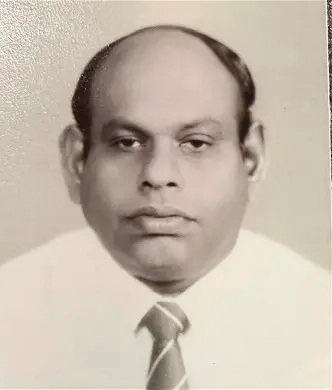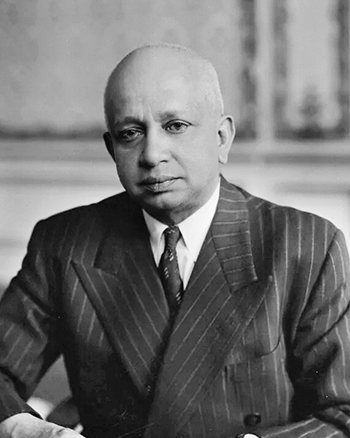Opinion
This Pretentious Plenitude

(loketa parakase, gedarata maragate )
“On 3 June, 1400, the Byzantine Emperor Manuel II Paleologus entered Paris. By the showy standards of contemporary state visits, Manuel cut a sory figure. Accompanied by fewer than sixty of his own attendants, speaking nothing but Greek, mounted on a borrowed white charger and dependent for his travelling expenses on his hosts, he had come to beg for money and troops in the hope of preserving his shrunken domains from the Ottoman Turks.”
– Cursed Kings, The Hundred Years War IV, 2015)
By Usvatte-aratchi
A few days ago, I went to Panadura to see my brother, 95 years old. We parked the car to go to the Arpico Supercentre at the southwestern corner of Galle Road and Nirmala Mawatha. From the park, I did not go into the store; I sat in the car. There were about 20 cars parked and people went into the store and drove away after making their purchases. There were more women shoppers than men. The women were distinctly well-clothed and appeared well-fed. They all wore slacks or skirts and upper garments, all in good taste with no garish hues. None wore a sari. All men wore slacks and shirts and none a kapati suit or sarong. All the cars glistened in the morning sun; none had scratches or worse damage. One car had a number plate BK; all the others had number plates with three letters. There was plenitude; where is the austerity the country is published to undergo? Or is austerity the burden borne by only one category of citizens? A few days later, as I entered through the gates to a hospital compound, I noticed that the man who issued tokens from a little cubicle in the heat and humidity wore a necktie. Public servants assembled before ministers invariably wearing a suit. The rooms are airconditioned to accommodate them. Doesn’t it make more sense to wear simple shirts in rooms cooled to a higher temperature to save fuel? Why this pretence of plenitude in this land of austerity? It is so poor that it bears the odium of having defaulted on its sovereign debt.
What are the rules of etiquette that require us to wear evening dress, no matter who the dignitary that one has to meet? Well, of course, anyone is entitled to wear funny clothes, even silken wigs in this high temperature and high humidity in torrid tropical weather. But in this impoverished hungry land, where children who attend school faint from starvation? There are reports of stunted and underweight children. I expect to read infant and maternal mortality rates for 2021, 2022 and 2023 higher than the excellent levels that our health services had ensured for us. The age cohorts born in 2020-2024 will bear the scars of this scourge throughout their lives.
Sometime in the mid-1980s, a friend of mine was the Indian Ambassador to Vietnam. She was very keen to learn Vietnamese. After a few weeks in the country, she hired someone to teach her Vietnamese. Although now written in Latin script, there is a range of diacritical marks to help one to speak a word with the proper tones -more complex than in Mandarin or Thai. (The Latin script was introduced in the 17th century by Portuguese Jesuit priests.) In the second week of lessons, the tutor took the liberty of raising a question with the Ambassador, one evening after the lesson. ‘Madam, with the flaps of the dress you wear, I can make a pretty blouse’. Isn’t it a pity that so much cloth must is wasted’? (Vietnamese are still small-made, perhaps genetically and the result of centuries of malnutrition.) The ambassador who was very sympathetic to what Vietnam was trying to achieve, was shocked by how right the tutor was. She took her lesson seriously. I was a student in Britain in the 1960s and stayed in my lodgings all summer, except to go to the theatre in London. One summer, I was invited to tea in the garden with the queen. Many students from Commonwealth countries were so invited. I had no suit to wear for the occasion nor did I consider it wise to invest in one, just to attend a tea party. (Mad Hatter might have considered it otherwise.) We are still a poor country and anyone who yearns for the use of expensive clothing must seek a fitting clime. Some of you must have observed the army-style warm collarless cardigan that President Volodymyr Zelensky wore when he addressed the US Congress, a rare honour bestowed on men from outside the US. Does a caparisoned elephant look more dignified than the real thing in the wild? Do murderers, plunderers, women abusers and forgers gain dignity when they wear kapati suits buttoned up to the chin? If clothes make for dignity, mannequins in shop windows must present the most dignified postures in the world.
Take the case of cars. In this small island with a short mileage of expressways and a speed limit of 100km per hour, where do people go in a Mercedes 350 or BMW 740 ? Those gas guzzlers, V8 vehicles which even Bhikkhu covet, are symbols of pretentious plenitude. I recall some MPs explaining in parliament that they needed expensive vehicles because they had to travel in their electorates on uneven roads. When NIssanka Wijewardene was the government agent in Badulla in the early 1960s, he toured the district on horseback and Uva is still not an area roads in good condition in that part of the country. Leonard Woolf, 123 years ago, toured the Hambantota district on horseback. Riding a horse on rough tracks and rural roads is no fun. I cannot see why MPs cannot travel about in cheaper cars which are less expensive to buy and also consume much less gas. All this plenitude is at the expense of rich and poor taxpayers. The frequent use of helicopters by the president and ministers is something we cannot afford. Once a relative of a president flew in a helicopter from Ratmalana to Maharagama, at government expense. A president travelled by helicopter several times to ‘inspect’ construction work on the Moragahakanda dam. I wondered how much engineering the man had in him to waste so many resources for so flimsy a reason. When a dam was built across Gal Oya at Inginiyagala in 1950-52 with two months to spare before the end of the contracted date, there was nobody flying around in helicopters. The Ampara-Siyambalanduwa road was a decade away and one had to drive to Chenkaladi to get to Inginiyagala, a tiring journey for a young man even in 1968-69. When a poor population struggles to climb higher in the income ladder, it does not help to grease it with opulent lifestyles by its leaders. That grease pulls down people back into poverty.
Our religious leaders do not help. The Durutu perahera was held a few weeks back. Navam perahera is on a grand scale. Then comes Avurudu when the whole country takes a holiday and eats and drinks as if there were no tomorrow. May is for vesak. June, and people sojourn in Anuradhapura. July is for many festivals in devale in the south. August puts up the spectacle in Mahanuvara. September opens a period of quietude in pansal only to begin again in November. Who objects to religiosity among believers but please undertake them without denying the rest of this economy resources. It is more important that a child goes to school regularly than that votive candles are lit on an altar.
Some places of religious importance in this country are mighty rich. Their daily income probably is in the millions. What is the educational institution or hospital that they financed to build and run? Even the Vidyodaya pirivena receives, to date a subvention out of taxpayers’ money. Why isn’t it maintained with the collections in the shrine with a Bo-tree in Kalutara? The collections are administered by the Public Trustee but why not give a sense of ownership to those that collect the money? The Venkateshwar kovil in Andhra Pradesh runs a fine university with a part of the huge income it earns. Superstitious politicians from our country contribute to that income. Satya Sai Baba organization in Bengaluru runs schools and provides pipe-borne water to villagers close to their offices. The Rama Krishna Mission in India has a brilliant record of having established and run many schools and colleges in India. Tatas have established research institutes that put out high-quality work. In the 13th and fourteenth centuries when England was probably poorer than Sri Lanka then and certainly poorer than even impoverished Sri Lanka today (2023), colleges that now comprise Oxford and Cambridge universities, were built and run by Roman Catholic churches, monasteries and rich individuals. Many Bishops established colleges in Oxford and Cambridge. Walter de Merton started Merton College in Oxford; Peterhouse in Cambridge had similar beginnings. They had to wait for Edward III and Henry VI to meet Royal benefactors of colleges. In the first settlements in Boston Bay, the immigrants established Harvard College (now Harvard University) in 1635 well before a systematic government came into being there. Someone needs to inquire why well-endowed religious establishments in this country, do not find it fitting that they establish educational facilities for bright students. They would rather gild with 13.5 kg of gold, a fence around a venerated tree.
Why do we so often mistake appearances for substance? More than 120 years ago, Thorstein Veblen coined the term ‘conspicuous consumption’ to identify behaviour patterns of people in opulent societies. What does one call this pretentious plenitude in a land where hunger haunts almost every household day after day?
Opinion
V. Shanmuganyagam (1940-2026): First Clas Engineer, First Class Teacher
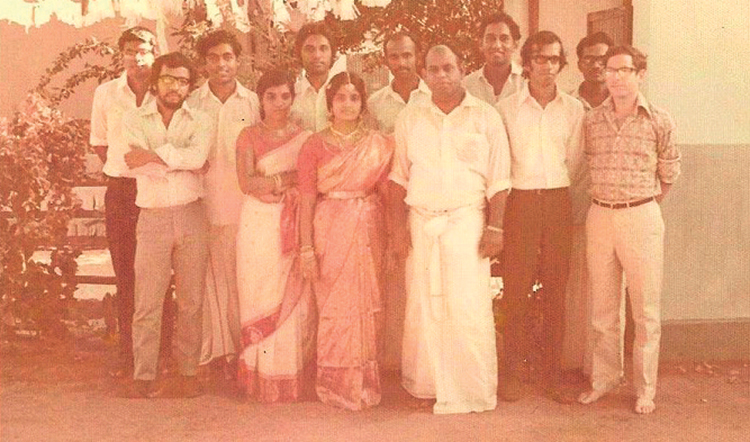
Quiet flows another don. The aging fraternity of Peradeniya Engineering alumni has lost another one of its beloved teachers. V. Shanmuganayagam, an exceptionally affable and popular lecturer for nearly two decades at the Peradeniya Engineering Faculty, passed away on 15 January 2026, in Markham, Toronto, Canada. Shan, as he was universally known, graduated with First Class Honours in Civil Engineering, in 1962, when the Faculty was located in Colombo. He taught at Peradeniya from 1967 to 1984, and later at the Nanyang Technological University in Singapore, before retiring to live in Canada.
In October last year, one of our colleagues, Engineer P. Balasundram, organized a lunch in Toronto to felicitate Shan. It was very well attended and Shan was in good spirits. At 85 he was looking as young as any of us, except for using a wheelchair to facilitate his movement. The gathering was remarkable for the outpouring of warmth and gratitude by nearly 40 or 50 Engineers, who had graduated in the early 1970s and now in their own seventies. One by one every one who was there spoke and thanked Shan for making a difference in their lives as a teacher and a mentor, not only in their professional lives but by extension in their personal lives as well.
As we were leaving the luncheon gathering there were suggestions to have more such events and to have Shan with us for more reminiscing. That was not to be. Within three months, a sudden turn for the worse in his condition proved to be irreversible. He passed away peacefully, far away across the world from the little corner of little Sri Lanka where he was born and raised, and raised in a manner to make a mark in his life and to make a difference in the lives of others who were his family, friends and several hundreds of engineering professionals whom he taught.
V. Shanmuganayagam was born on May 30, 1940, in Point Pedro, to Culanthavel and Sellam Venayagampillai. His family touchingly noted in the obituary that he was raised in humble beginnings, but more consequentially his values were cast in the finest of moulds. He studied at Hartley College, Point Pedro, and was one of the four outstanding Hartleyites to study engineering, get their first class and join the academia. Shan was preceded by Prof. A. Thurairajah, easily Sri Lanka’s most gifted academic engineering mind, and was followed by David Guanaratnam and A.S. Rajendra. All of them did Civil Engineering, and years later Hartley would send a new pair of outstanding students, M. Sritharan and K. Ramathas who would go on to become highly accomplished Electrical Engineers.
Shan graduated in 1962 with First Class Honours and may have been one of a very few if not the only first class that year. Shan worked for a short while at the Ceylon Electricity Board before proceeding to Cambridge for postgraduate studies specializing in Structures. His dissertation on the Ultimate Strength of Encased Beams is listed in the publications of the Cambridge Structures Group. He returned to his job at CEB and then joined the Faculty in 1967. At that time, Shan may have been one of the more senior lecturers in Structures after Milton Amaratunga who too passed away late last year in Southampton, England.
When we were students in the early 1970s, there was an academic debate at the Faculty as to whether a university or specific faculties should give greater priority to teaching or research. Shan was on the side of teaching and he was quite open about it in his classes. He would supplement his lectures with cyclostyled sheets of notes and the students naturally loved it. It was also a time when Shan and many of his colleagues were young bachelors at Peradeniya, and their lives as academic bachelors have been delightfully recounted in a number of online circulations.
The cross-sectional camaraderie at the Faculty in those days is well captured in one of the photographs taken at Shan’s wedding at Point Pedro, in 1974, which too has been doing the rounds and which I have inserted above. Flanking Shan and his bride Kalamathy, from Left to Right are, M. Dhanendran, Nandana Rambukwella, K. Jeyapalan, Wickrama Bahu Karunaratne, A.S. Rajendra, Lal Tennekoon, Tusit Weerasooria, and R. Srikantha. Sadly, Rambukwella, Karunaratne (Bahu), Tennekoon and now Shan himself, are no longer with us.
Like other faculty members, Shan kept contact with his former students turned practising engineers and they would reach out to him to solicit his expertise in their projects. In the early 1980s, when I was working as Resident Project Manager with my Peradeniya contemporaries, JM Samoon and K. Balasundram, at the Hanthana Housing Scheme undertaken by the National Development Housing Authority (NHDA), Shan was one of the project consultants helping us with concrete technology involving mix design and in situ strength testing using the testing facilities at the Faculty.
The Hanthana Team Looking back, the Hanthana housing scheme construction was the engineering externalization of the architectural imaginings of Tanya Iousova and Suren Wickremesinghe, for building houses on hill slopes without flattening the hills. The project involved the construction of hundreds of housing units with supporting infrastructure comprising roads and drainage, water supply and sanitary, and electricity distribution using underground cables. Tanya & Suren Wickremasinghe were the Architects with an Italian construction company as contractors.
To their credit, Tanya and Suren assembled quite a team of Consulting Engineers that was a cross-section of E’Fac alumni, viz., Siripala Kodikkara and Siripala Jayasinghe (Contract Administration); Prof. Thurairajah (Foundations & Soil Mechanics); S.A. Karunaratne (Structures); V. Shanmuganyagam (Concrete Technology); Neville Kottagama and DLO Mendis (Roads & Drainage); K. Suntharalingam (Water Supply & Sanitary); and Chris Ratnayake (Electrical).
As esoteric gossip goes, DLO Mendis had an informal periodization of engineering graduates, identifying them as either Before-Thurai or After-Thurai, centered on 1957 – the year Prof. Thurairajah graduated with supreme distinction and went on to do groundbreaking theoretical research in Soil Mechanics at Cambridge. Of the Hanthana consultant team, Neville Kottagama and DLO Mendis were before Thurai by six years, Shan was five years after, and all the others came later. Sadly though, only Tanya and Chris are with us today from the 1980s group named above.
After Hanthana came 1983 when all hell broke loose and hundreds of professionals and their families were forced to leave Sri Lanka. Shan left Peradeniya and joined Nanyang Technological University in Singapore, encouraged by his Cambridge contemporaries from Singapore. He taught at Nanyang for twelve years (1984-1996) before moving to Canada with his wife and three sons who were by then ready for university education.
All three children have done exceptionally well in their studies and professional careers. The oldest, Dhanansayan, is a Medical Doctor and a Professor at the University of Wisconsin School of Medicine and Public Health, in Madison, United States. That was where India’s Jayaprakash Narayan and Sri Lanka’s Philip Gunawardena had their university education a hundred years ago.
The younger two sons took to Engineering. The second son, Kalaichelvan, is Program Manager at Creation Technologies, an award-winning global electronics manufacturing service provider. And the youngest, Dhaksayan, is the Chief Information Officer (CIO) at the Toronto Transit Commission (TTC), which is North America’s third-largest urban transit system.
All three have done their parents proud and Shan would have been gratified to see them achieve exemplary success in their chosen fields. A first class Engineer and a first class teacher, Shan was also a great father and a loving grandfather. As we remember Professor Shanmuganyagam, we extend our thoughts and sympathies to his beloved wife Kalamathy, his sons and their young families
by Rajan Philips
Opinion
Cannavarella: Estate once owned by OEG with a heritage since 1880
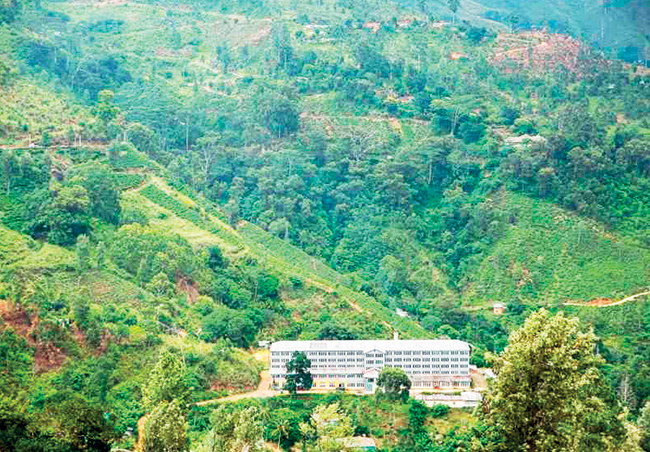
Established in 1880, Cannavarella Estate stands among the most historically significant plantations in Sri Lanka, carrying a legacy that intertwines agricultural heritage, colonial transitions and modern development. Its story begins with the cultivation of cinchona, a medicinal bark used to produce quinine, which is a vital treatment for malaria at the time, introduced when coffee estates across the island were failing.
Under the ownership of Messrs Macfarlane, Cannavarella rapidly gained a reputation for producing cinchona at ideal elevations between 4,000 and 5,000 feet above sea level. At that time, the estate spanned around 750 acres and played a pivotal role in the island’s shift from coffee to alternative plantation crops during the late 19th century.
A transformative chapter began when Christopher B. Smith purchased the property and unified several surrounding estates- Moussagolla, Cannavarella, East Gowerakelle, and Naminacooly- into what became known as the Cannavarella Group. This amalgamation created a vast holding of approximately 1,800 acres. By 1915, nearly 1,512 acres of this extent were cultivated in tea, marking the estate’s full transition from cinchona to the crop that would define its identity for generations.
The Group was managed by the Eastern Produce and Estates Company from 1915 until 1964, after which stewardship passed successively to Walker & Sons Company Ltd, and then to George Steuart Company Ltd by 1969.
A defining moment in the estate’s history arrived in 1971 when Sir Oliver Goonetilleke, former Governor General of Ceylon, acquired the estate. Under his ownership, it came under the London-based company Ceyover Ltd., a name derived from “Cey” for Ceylon and “Over” for Oliver.
The estate remained under private ownership until the nationalization wave of 1975, during which Cannavarella was brought under the Janatha Estates Development Board (JEDB). For nearly two decades it was managed under government purview until the plantation sector was re-privatised in 1992.
Thereafter, Cannavarella Estate moved under the management of Namunukula Plantations Limited, first through BC Plantation Services, then under John Keells Holdings’ Keells Plantation Management Services and eventually under the ownership of Richard Pieris & Company PLC, where it continues today as part of the Arpico Plantations portfolio.
Blending heritage, landscape and community
Situated along the northeastern slopes of the scenic Kabralla-Moussagolla range and bordering the Namunukula mountain range, Cannavarella Estate spans a total extent of 800 hectares. Its six divisions rise across elevations from 910 to 1,320 metres above sea level, creating a landscape ideal for cultivating premium high-grown tea. Of the total land area, 351 hectares are dedicated to mature tea, while 54 hectares consist of VP tea, representing 16 % of the estate.
Among its most remarkable features are fields containing seedling tea bushes more than a century old, living symbols of Sri Lanka’s plantation legacy that continue to thrive across the slopes. The estate is also home to the origin of the Menik River, which begins its journey in the Moussagolla Division, adding an ecological richness to Cannavarella’s natural environment.
Cannavarella’s history of leadership reflects broader transformations within the plantation industry. The last English superintendent, Mr. Charles Edwards, oversaw the estate during the final phase of British management. In 1972, he was succeeded by Franklin Jacob, who became the first Sri Lankan superintendent of the Cannavarella Group, marking a shift toward local leadership and expertise in plantation management.
Development within Cannavarella Estate has never been confined to agriculture alone. Over the past decade, the estate has strengthened its emphasis on community care, diversification and improving living conditions for its workers. In 2022, coffee planting was initiated in Fields 7 and 8 of the NKU Division, covering 2.5 hectares as part of a broader effort to introduce alternative revenue streams while complementing tea cultivation.
The estate’s commitment to early childhood development is reflected in the initiation of a morning meal programme across all Child Development Centres from 2025, ensuring that children receive nutritious meals each day. A newly constructed Child Development Centre in the EGK Division, completed in 2020, now offers modern facilities including a play area, study room and kitchen, symbolizing the estate’s dedication to nurturing the next generation. In 2015, a housing scheme consisting of 23 new homes was completed and handed over to workers in the CVE Division, significantly improving quality of life and providing families with safer, more stable living environments.
A future built on stability and renewal
Cannavarella Estate is preparing to undertake one of its most important social development initiatives. A major housing programme has been proposed to relocate 69 families currently residing in landslide-prone areas of the Moussagolla Division. Supported by the Indian Housing Programme, this effort aims to provide secure, sustainable housing in safer terrain, ensuring long-term stability for vulnerable families and reducing disaster risk in the region.
Across its history, Cannavarella Estate has remained a landscape shaped both by the land and the people who call it home. Cannavarella continues to honour its roots while building a modern legacy that uplifts both the estate and its people. (Planters Association news release)
Opinion
From the Lecture Hall to the Global Market: How Sri Lankan students are mastering the “Gig Economy”

Have you ever wondered how a university student, between heavy textbooks and late-night study sessions, manages to earn a professional income in US dollars? It sounds like a dream, but for thousands of Sri Lankans, it’s becoming a daily reality through online freelancing.
A recent study published in the Ianna Journal of Interdisciplinary Studies has pulled back the curtain on this digital revolution. By interviewing 21 successful student freelancers across Sri Lanka, researchers have mapped out exactly what it takes to turn a laptop and an internet connection into a thriving career.
The Rise of the “Earn-as-you-learn” Era
In Sri Lanka, the number of online freelancers has exploded from about 20,000 in 2016 to over 150,000 today. While our traditional education system often focuses on preparing students for 9-to-5 office jobs , these students are diving into the “Gig Economy” a digital marketplace where they sell specific skills, like graphic design or programming, to clients all over the world.
The Secret Sauce for Success
So, what makes some students succeed while others struggle? The research found that it isn’t just about being good at coding or design. Success comes down to six “Core Pillars”:
· A Growth Mindset: The digital world moves fast. Successful students don’t just learn one skill; they are constantly updating themselves to ensure they don’t become “outdated”
· The Balancing Act:
How do they handle exams and clients? They don’t use a magic wand; they use strict time management. Many work late into the night (from 6 p.m. to midnight) to accommodate international time zones.
· The Power of “Hello”:
Since most clients are in the USA or UK, strong English and clear communication are vital. It’s about more than just talking; it’s about negotiating prices and building trust.
· Proactive Problem Solving:
Successful freelancers don’t wait for things to go wrong. They update their clients regularly and fix issues before they become headaches.
Why This Matters for Sri Lanka
Right now, our universities don’t always teach “how to be a freelancer”. This study suggests that if we integrate freelancing modules and mentorship into our degree programs, we could significantly reduce graduate unemployment. It’s a way for students to gain financial independence and bring much-needed foreign currency into our economy while still in school.
You Can Do It Too
If you’re a student (or the parent of one), the message is clear: the global market is open for business. You don’t need to wait for graduation to start your career. With a bit of flexibility, a willingness to keep learning, and a proactive attitude, you can transition from a learner to an earner.
The Research Team Behind the Study
This groundbreaking research was conducted by a dedicated team from the Department of Business Management at the SLIIT Business School (Sri Lanka Institute of Information Technology). The authors of the study include:
· Lihini Niranjana Dasanayaka
· Thuvindu Bimsara Madanayake
· Kalana Gimantha Jayasekara
· Thilina Dinidu Illepperuma
· Ruwanthika Chandrasiri
· Gayan Bandara
by Ruwanthika Chandrasiri
-

 Business2 days ago
Business2 days agoZone24x7 enters 2026 with strong momentum, reinforcing its role as an enterprise AI and automation partner
-

 Business6 days ago
Business6 days agoSLIM-Kantar People’s Awards 2026 to recognise Sri Lanka’s most trusted brands and personalities
-

 Business7 days ago
Business7 days agoAll set for Global Synergy Awards 2026 at Waters Edge
-

 Business2 days ago
Business2 days agoHNB recognized among Top 10 Best Employers of 2025 at the EFC National Best Employer Awards
-
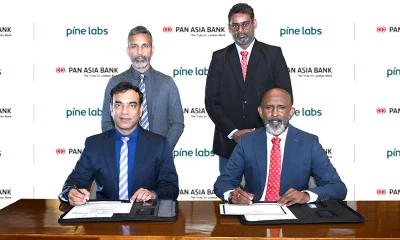
 Business6 days ago
Business6 days agoAPI-first card issuing and processing platform for Pan Asia Bank
-

 Business2 days ago
Business2 days agoGREAT 2025–2030: Sri Lanka’s Green ambition meets a grid reality check
-

 Editorial4 days ago
Editorial4 days agoAll’s not well that ends well?
-

 Features4 days ago
Features4 days agoPhew! The heat …


